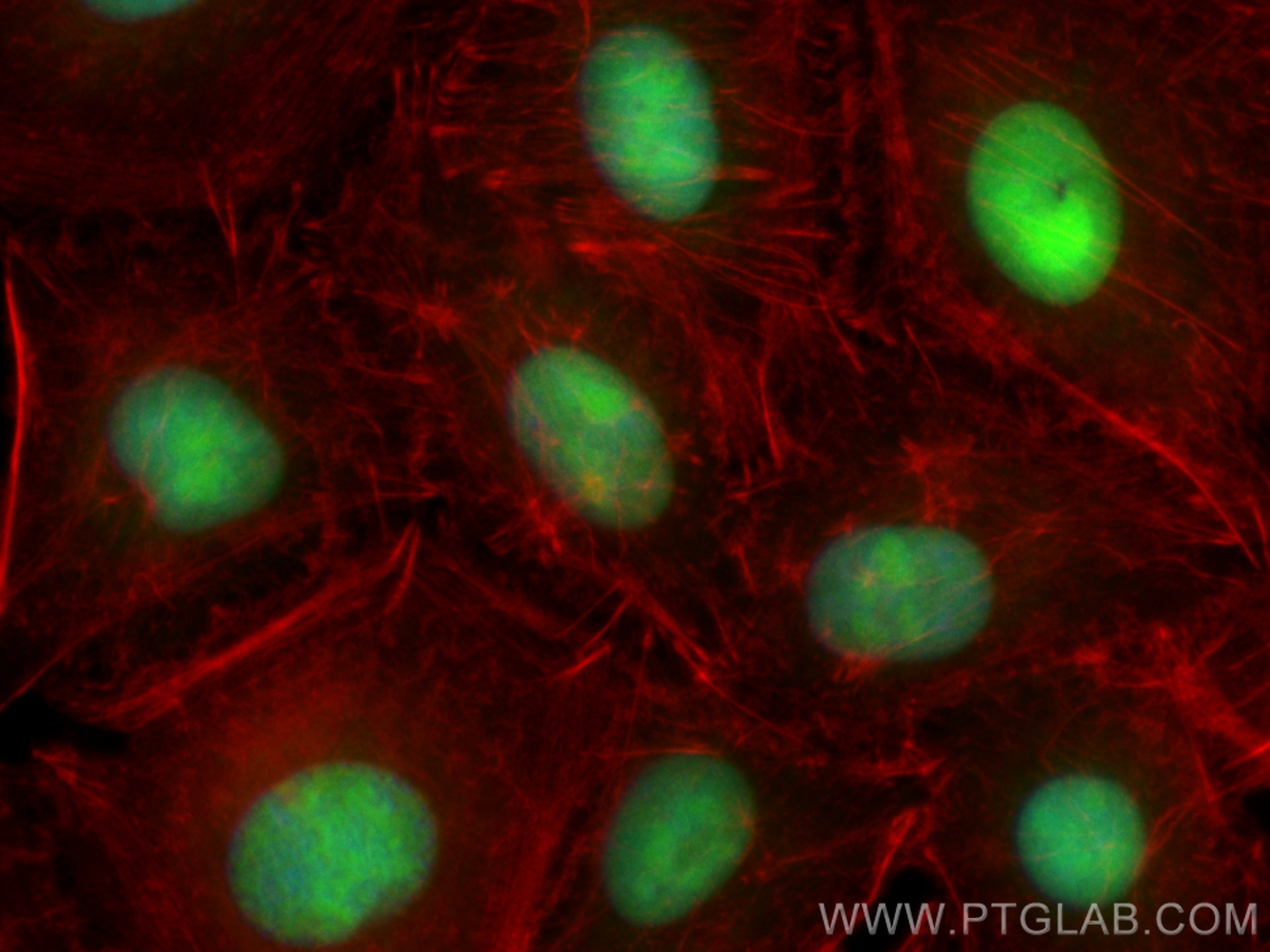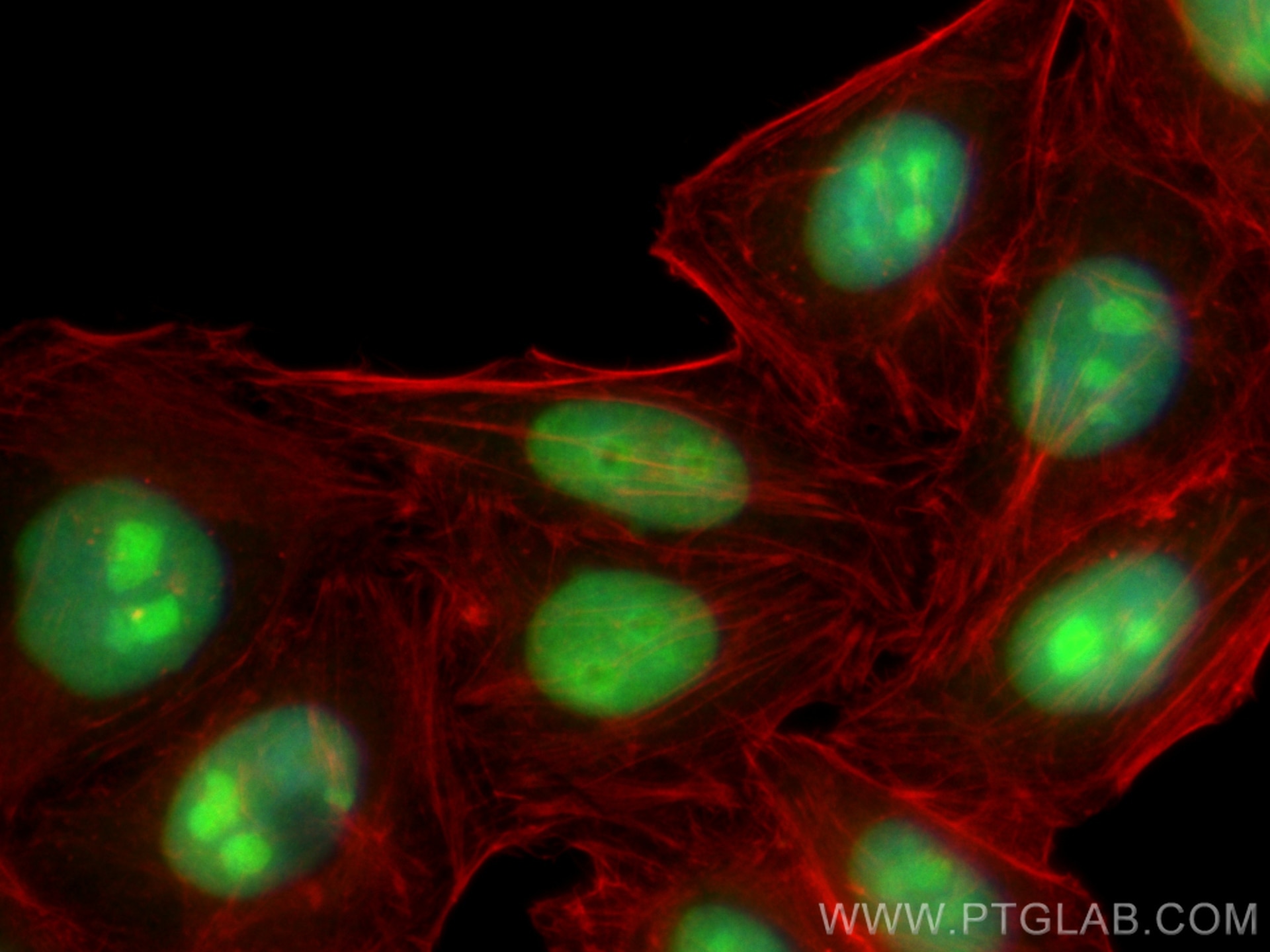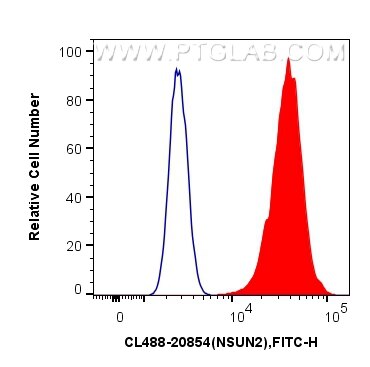Validation Data Gallery
Tested Applications
| Positive IF/ICC detected in | HepG2 cells, A549 cells |
| Positive FC (Intra) detected in | HeLa cells |
Recommended dilution
| Application | Dilution |
|---|---|
| Immunofluorescence (IF)/ICC | IF/ICC : 1:50-1:500 |
| Flow Cytometry (FC) (INTRA) | FC (INTRA) : 0.40 ug per 10^6 cells in a 100 µl suspension |
| It is recommended that this reagent should be titrated in each testing system to obtain optimal results. | |
| Sample-dependent, Check data in validation data gallery. | |
Product Information
CL488-20854 targets NSUN2 in IF/ICC, FC (Intra) applications and shows reactivity with human samples.
| Tested Reactivity | human |
| Host / Isotype | Rabbit / IgG |
| Class | Polyclonal |
| Type | Antibody |
| Immunogen |
CatNo: Ag14791 Product name: Recombinant human NSUN2 protein Source: e coli.-derived, PET28a Tag: 6*His Domain: 415-767 aa of BC001041 Sequence: HHQNTGGFFVAVLVKKSSMPWNKRQPKLQGKSAETRESTQLSPADLTEGKPTDPSKLESPSFTGTGDTEIAHATEDLENNGSKKDGVCGPPPSKKMKLFGFKEDPFVFIPEDDPLFPPIEKFYALDPSFPRMNLLTRTTEGKKRQLYMVSKELRNVLLNNSEKMKVINTGIKVWCRNNSGEEFDCAFRLAQEGIYTLYPFINSRIITVSMEDVKILLTQENPFFRKLSSETYSQAKDLAKGSIVLKYEPDSANPDALQCPIVLCGWRGKASIRTFVPKNERLHYLRMMGLEVLGEKKKEGVILTNESAASTGQPDNDVTEGQRAGEPNSPDAEEANSPDVTAGCDPAGVHPPR 相同性解析による交差性が予測される生物種 |
| Full Name | NOL1/NOP2/Sun domain family, member 2 |
| Calculated molecular weight | 767 aa, 86 kDa |
| Observed molecular weight | 90-100 kDa |
| GenBank accession number | BC001041 |
| Gene Symbol | NSUN2 |
| Gene ID (NCBI) | 54888 |
| RRID | AB_3084042 |
| Conjugate | CoraLite® Plus 488 Fluorescent Dye |
| Excitation/Emission maxima wavelengths | 493 nm / 522 nm |
| 激发激光 | Blue laser (488 nm) |
| Form | |
| Form | Liquid |
| Purification Method | Antigen affinity purification |
| UNIPROT ID | Q08J23 |
| Storage Buffer | PBS with 50% glycerol, 0.05% Proclin300, 0.5% BSA{{ptg:BufferTemp}}7.3 |
| Storage Conditions | Store at -20°C. Avoid exposure to light. Stable for one year after shipment. Aliquoting is unnecessary for -20oC storage. |
Background Information
NSUN2, also known as SAKI or Misu (Myc-induced SUN-domain-containing protein), is a methyltransferase which catalyses (cytosine-5-)-methylation of tRNA. NSUN2 is direct target gene of c-Myc and may act downstream of Myc to regulate epidermal cell growth and proliferation. NSUN2 is overexpressed in various cancer tissues and may be a valuable target for cancer therapy and a cancer diagnostic marker. Recently a splicing mutation in NSUN2 has been identified as the cause of a Dubowitz-like syndrome, an autosomal recessive disorder.
Protocols
| Product Specific Protocols | |
|---|---|
| IF protocol for CL Plus 488 NSUN2 antibody CL488-20854 | Download protocol |
| Standard Protocols | |
|---|---|
| Click here to view our Standard Protocols |



